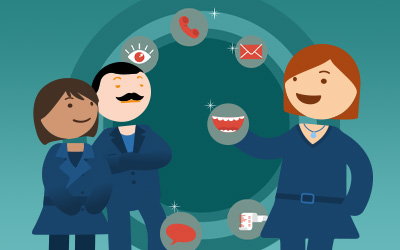Related Articles
Related Articles
Customer Service Training
Explore More
Workplace Health And Safety
Dealing With Customers Online
Business Phone Etiquette
Time Management
Customer Service Training
Handling Customer Complaints
Learner Engagement
Prevent Customer Churn
Customer Satisfaction
Sales Training
Why Empathy Training is Crucial for Customer Service Success
In today's competitive business landscape, exceptional customer service can be the key differentiator that sets a company apart from its rivals. And at the heart of outstanding customer service is empathy.
When customers reach out for support or assistance, they want to be heard, understood, and valued. That's where empathy training comes into play.
Empathy training equips customer service representatives with the skills and knowledge needed to connect with customers on a deeper level. It goes beyond just resolving issues; it focuses on building genuine relationships and fostering a positive customer experience. By understanding the needs, emotions, and perspectives of customers, empathy-trained representatives can provide personalized solutions, alleviate frustrations, and leave a lasting impression.
Moreover, empathy training benefits both customers and businesses. Customers feel valued and appreciated, leading to increased satisfaction, loyalty, and positive word-of-mouth referrals. Businesses, on the other hand, see improved customer retention rates, higher conversion rates, and enhanced brand reputation.
In an increasingly digital world where face-to-face interactions are becoming less common, empathy training is crucial for customer service success. By instilling empathy in every customer interaction, companies can create meaningful connections, drive customer loyalty, and ultimately, thrive in today's competitive marketplace.
The importance of customer service in business
Exceptional customer service is no longer just a nice-to-have; it's a necessity in today's competitive business landscape. Customers have more options than ever before, and their expectations are higher than ever. They want to be treated with respect, have their needs met, and feel valued by the companies they choose to do business with.
When customer service falls short, it can have significant repercussions for a business. Customers who have a negative experience are more likely to take their business elsewhere and share their frustrations with others. On the other hand, customers who have a positive experience not only become loyal patrons but also become advocates for the brand, endorsing it to their friends and family.

The benefits of empathy training for customer service
Empathy training is a specialized form of customer service training that focuses on developing the ability to understand and share the feelings of others. It goes beyond simply resolving issues; it aims to build genuine connections and foster a positive customer experience.
One of the key benefits of empathy training is the ability to provide personalized solutions. By understanding the needs, emotions, and perspectives of customers, empathy-trained representatives can tailor their responses and recommendations to meet individual needs. This level of personalization can significantly enhance the customer experience, leading to increased satisfaction and loyalty.
In addition to personalized solutions, empathy training also helps customer service representatives alleviate frustrations. When customers reach out for support or assistance, they often do so because they are already experiencing some level of frustration. By empathizing with their situation, customer service representatives can validate their feelings, diffuse tension, and create a more positive interaction.

Furthermore, empathy training has a profound impact on the overall brand reputation. When customers feel heard, understood, and valued, they are more likely to view the company in a positive light. This positive perception can lead to increased customer retention rates, higher conversion rates, and positive word-of-mouth referrals.
Implementing empathy training in your customer service team
Implementing empathy training in your customer service team requires a strategic approach. It's not enough to simply provide a one-time training session and expect lasting results. Instead, it's essential to create a culture of empathy within the organization and provide ongoing support and reinforcement.
An effective way to implement empathy training is through short bit sized videos that introduce and reinforce concepts in ways that boost learner engagement and increase learner retention.
This training can then be backup up through discussion questions and role-playing exercises. These allow customer service representatives to practice their empathetic skills in a safe and controlled environment. By discussing and simulating real-life scenarios, representatives can develop their ability to listen actively, ask probing questions, and respond empathetically.
Another crucial aspect of implementing empathy training is providing ongoing feedback and coaching. Regular feedback sessions allow managers to assess the progress of their team members and provide guidance on areas that need improvement. By providing constructive feedback and coaching, managers can help their team members refine their empathetic skills and continue to grow.

Additionally, it's important to create a supportive environment where empathy is valued and recognized. Recognizing and rewarding acts of empathy can incentivize customer service representatives to consistently demonstrate empathetic behavior. This can be done through employee recognition programs, performance evaluations, or team-wide celebrations.
Common challenges and how to overcome them in empathy training
Implementing empathy training can come with its own set of challenges. Here are some common challenges and strategies to overcome them:
By addressing these challenges head-on and implementing strategies to overcome them, companies can ensure the long-term success of their empathy training programs and create a customer service team that consistently delivers exceptional experiences.
-
Resistance to change: Some team members may be resistant to adopting new empathetic behaviors. To overcome this, provide clear explanations of the benefits of empathy training and offer ongoing support and coaching.
-
Lack of time: Finding time for training can be a challenge in a fast-paced customer service environment. Consider incorporating empathy training into regular team meetings and scheduling short, bite-sized training sessions in the form of micro-learning training videos
-
Measuring effectiveness:It can be challenging to measure the effectiveness of empathy training. Implement customer satisfaction surveys, monitor customer feedback, and track key performance indicators to gauge the impact of empathy training on customer service metrics.
-
Sustaining momentum: After the initial training, it's important to sustain momentum and reinforce empathetic behaviors. Incorporate empathy-related topics into team meetings, share success stories, and regularly provide feedback and coaching to keep empathy top of mind.

In conclusion, empathy training is crucial for customer service success in today's competitive business landscape.
By equipping customer service representatives with the skills and knowledge needed to connect with customers on a deeper level, companies can build genuine relationships, foster positive experiences, and drive customer loyalty. Implementing an effective empathy training program can lead to increased customer satisfaction, higher conversion rates, and a strong brand reputation. It's time for businesses to prioritize empathy and reap the rewards in today's digital world. Many of us struggle with this concept but it doesn’t need to be difficult. Simply follow the steps outlined in this article, and you’ll be one step closer to mastering efficient time keeping.
For short, practical, easy to implement training videos on empathy in customer service visit canity.com
Most Popular Blogs














Published by Canity